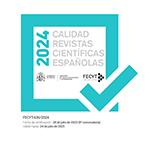La soledad de lo Uno: Mística y teología negativa en la obra de Michel de Certeau”.
Abstract
A partir del momento en que el cuerpo de lo único se oculta, y el sepulcro es vaciado de toda presencia, se tiene una falta primordial en común (corpus mysticum). Por ello, esta ausencia, en lo relativo al mundo cristiano, se expresa en términos de un ocultamiento originario (Deus absconditus). Por su parte, la tradición teológica y mística medieval, heredera e interlocutora de toda una tradición metafísica del mundo helénico (especialmente el neoplatonismo), sistematizó a lo largo de los siglos la gramática de esta desaparición en términos de una inaccesibilidad e irreductibilidad del ser, a saber, una negatividad esencial del Logos (v.gr. “ni esto ni aquello”, “ni lo uno ni lo otro”). Podría anticiparse, por tanto, como punto de llegada, que el lenguaje de la tradición de la mística cristiana, no es sólo el lenguaje de la falta de un cuerpo (la encarnación del Verbo), sino también, la búsqueda de un lenguaje suficiente para reconciliar lo universal con la unidad autónoma del lenguaje. Este artículo se propone, pues, reconstruir la manera en que el historiador y teólogo jesuita francés, Michel de Certeau, reconstruyó genealógicamente parte de una tradición mística que, inmersa en una serie de variables y posibilidades históricas de enunciación, reconstruyó genealógicamente parte de una tradición mística que desembocaría en una relación de alteridad. Este sería uno de los desenlaces en la modernidad temprana occidental de aquello que desde los orígenes del neoplatonismo se conoce como la soledad de lo Uno.Downloads
##submission.format##
Licenza
La revista Logos. Anales del Seminario de Metafísica, para fomentar el intercambio global del conocimiento, facilita el acceso sin restricciones a sus contenidos desde el momento de su publicación en la presente edición electrónica, y por eso es una revista de acceso abierto. Los originales publicados en esta revista son propiedad de la Universidad Complutense de Madrid y es obligatorio citar su procedencia en cualquier reproducción total o parcial. Todos los contenidos se distribuyen bajo una licencia de uso y distribución Creative Commons Reconocimiento 4.0 (CC BY 4.0). Esta circunstancia ha de hacerse constar expresamente de esta forma cuando sea necesario. Puede consultar la versión informativa y el texto legal de la licencia.











